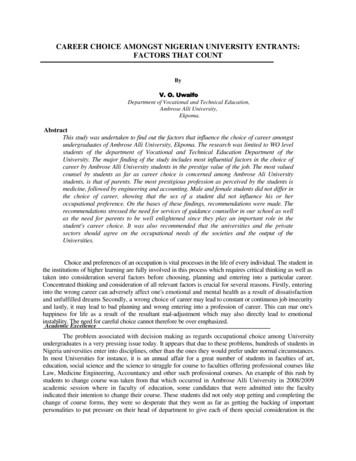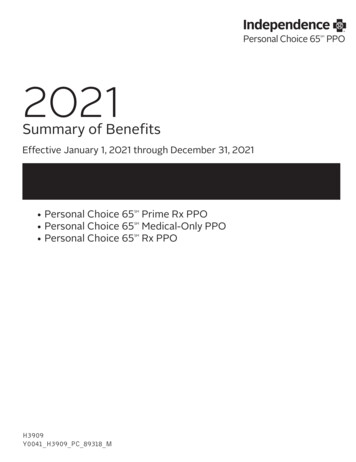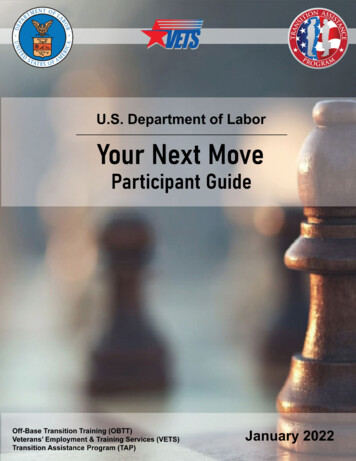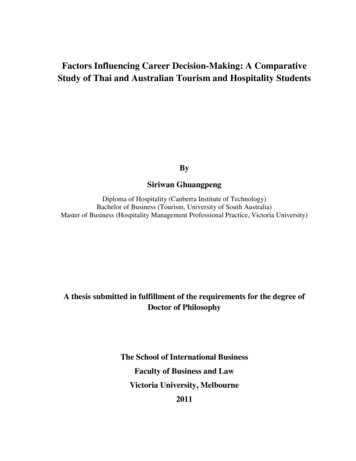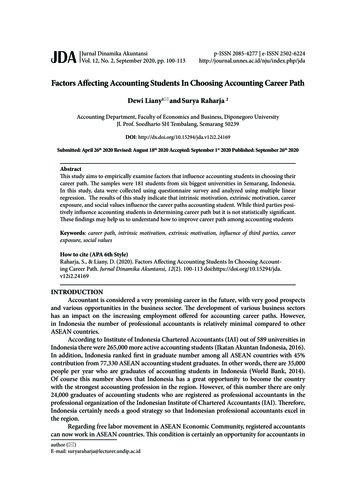
Transcription
Management Science Letters 10 (2020) 3183–3188Contents lists available at GrowingScienceManagement Science Lettershomepage: www.GrowingScience.com/mslFactors affecting the career choice of students in tourism: Evidence from Danang city, VietnamHo Tuan Vua*aFacultyof Accounting, Duy Tan University, Da Nang, 550000, Vietnam; Institute of Research and Development, Duy Tan University, DaNang, 550000, VietnamCHRONICLEABSTRACTArticle history:Received: March 3, 2020Received in revised format:March 25 2020Accepted: May 2, 2020Available online:May 3, 2020Keywords:Career choiceStudentsTourismDanangVietnamThe purpose of this research was to determine the factors affecting the career choice of students inTourism in Danang City, Vietnam. The survey adopted some questionnaire from the existing literature, distributed among 350 randomly chosen participants and managed to collect 300 properlyfilled ones. Cronbach’s Alphas were well above the desirable level and confirmed the overall survey. Exploratory factor analysis (EFA) was implemented to reduce the important factors into sixgroups and multiple regression analysis (MRA) was executed in order to measure the effects ofeach group on the career choice. The survey results show that the career choice of students in Tourism was due to career opportunities, belief in self-capacity, culture, intellect and the imposition ofothers. 2020 by the authors; licensee Growing Science, Canada1. IntroductionDanang is a tourist city of Vietnam. The city is a popular tourist destination and has many unique tourist activities. The qualityof tourism’s staff is the main reason for attracting many people. According to a forecast accomplished in 2020, Da Nang willwelcome 8.5 million visitors, including 2.5 million international visitors, 6 million domestic visitors and the demand for directtourism labor will reach 35,289. In particular, the accommodation industry in 2020 will increase to 26,000 rooms, 62,000rooms are forecasted in 2030 and will require 65,000 to 70,000 employees for the trained hotel industry. This shows that thedemand for training at educational institutions is extremely urgent. There were many researches on the career choice ofstudents as well as factors affecting the career choice of students. Some researches on the career choice of students andfactors affecting the career choice of students were performed by Chapman (1981), Paolillo and Estes (1982), Oanh (1996),Auyeung and Sands (1997), Borchert (2002), Qui and Thi (2009). However, there had not been any research on factors affecting the career choice of students in Tourism in Danang City, Vietnam. Therefore, this study will focus on the career choiceof students in Tourism as well as factors affecting them in Danang City, Vietnam.2. Literature Review2.1. The career choice of studentsAccording to Borchert (2002) there are three main elements affecting the choice of career including environment, opportunityand personal characteristics, and personal characteristics maintains the highest importance for choosing the job of students ofhigh school. Tang et al. (2008) used the model of career society development theory (Felton et al., 1994) surveying factorsaffecting the work choice trend of the students of high school. This research pointed out that the studied knowledge, self* Corresponding author.E-mail address: hotuanvu2007@gmail.com (H.T. Vu) 2020 by the authors; licensee Growing Science, Canadadoi: 10.5267/j.msl.2020.5.003
3184assessment ability for career, benefits and expected results in career development process affect the choice of the job ofstudents of high school. Chapman (1981) argued that university factors such as tuition fees, geographic location, cost supportpolicies or dormitory environment will influence the student's choice of school. In Vietnam, Oanh (1996) showed that theeffectiveness of the choice of the work of students depends on 3 elements mainly based on “triangle of career guidance”including awareness of career world, awareness of the demanding work of the society and advising work. Qui and Thi (2009),through the analysis of 227 answer sheets of high school students in five high schools in Quang Ngai province, showed fourfactors including future employment opportunities, characteristics of the university, the student personally that influence thedecision to choose a university.2.2. Factors affecting the career choice of students(1) Belief in self-capacity: According to Bandura (1997) “Believe in self-capacity is an identification of individual aboutpsycho-physical characteristics of themselves meet the requirements of a certain job and ensure that the work achieves aresult”. According to this theory, there are four causes of believing in self-capacity: experience of themselves; social learning;the incentive of society and emotional states. From this, the author hypothesized the following:Hypothesis 1 (H1): There is a positive effect of belief in self-capacity on the career choice of students in Tourism.(2) Career opportunities: These are the factors favorable for the career development of students when working, such as jobopportunities, increasing incomes, stable jobs, dynamic and professional working environment (Felton et al., 1994; Tan &Laswad, 2006). However, Jackling and Calero (2006) do not agree with this view.Hypothesis 2 (H2): There is a positive effect of career opportunities on the career choice of students in Tourism.(3) Culture: Cultural values according to Hofstede (1980) include: The gap of power, individualism, the avoidance of unknownissues, masculinity, long-term orientation, passion for restraint. Some people believe that Vietnamese culture has a middledistance of power, collectivism, avoiding unclear issues and long-term orientation.Hypothesis 3 (H3): There is a positive effect of culture on the career choice of students in Tourism.(4) Intellect: Myburgh (2005) studied the factors that influence the choice of becoming an accountant for freshmen at PretoriaUniversity, the aptitude as well as the advice and guidance of parents. Hobbies are regular or habitual particles to bring peoplejoy and excitement. Interest is an important determinant for students to choose an accounting profession (Jackling & Calero,2000).Hypothesis 4 (H4): There is a positive effect of intellect on the career choice of students in Tourism.(5) The imposition of others: Advice of family members, relatives, teachers and friends impact on intents of students choiceof accountancy (Tan & Laswad, 2006). Similarly, Auyeung and Sands (1997) indicated that parents, teachers, alumni, friendswill affect the choice of career of students of Asia. Because of the effect of cultural tradition, their decisions focus on towardfamily.Hypothesis 5 (H5): There is a negative effect of the imposition of others on the career choice of students in Tourism.2.3. Proposal of research modelBased on the research of previous authors and the theoretical background presented, combined with the study of characteristicsof tourism students, the author built the proposed research model as follows:Belief in self-capacity (BEL)Career opportunities (OPP)Culture (CUL)The career choice of students in Tourism(CHO)Intellect (INT)The imposition of others (IMP)Fig. 1. Proposed model
H.T.Vu / Management Science Letters 10 (2020)31853. Data Collection and Research MethodologyThe data were collected from the survey at 3 universities during the fourth quarter of 2019 in Danang City, Vietnam. Therewere 350 students of the tourism department (in the total of 1,000 students at Universities in Danang City) who participatedin this survey. After eliminating the invalid votes, 300 remaining votes were reliable for analysis. To achieve the goals ofthis research, we have used a combination of the qualitative and quantitative methods. Qualitative research was applied byinterviewing the experts. Based on the collecting opinions from experts (including the Lectures in tourism, Tourism Associations, Danang Tourism Department) about the factors affecting the career choice of students in tourism, we have developed, adjusted and rearranged the questionnaire to set a formal scale to do the survey at Universities in Danang City, Vietnam. Quantitative method was used by these steps: designing the study, collecting data, quantitative analysis was also usedbased on software version 20.0 SPSS. This software has been used to synthesize and present basic data about the frequencyof variables and statistical description of factors and their impacts on the career choice of students in tourism. In this study,first author used Cronbach Alpha Test techniques to test the factors of the scale then we have used technical analysis exploratory factor (EFA) to reduce the observed variables, change variable names and models shortened; finally we ran regression models through regression analysis techniques to assess the final conclusions of the factors that affect the careerchoice of students in tourism at Universities of Danang City.4. Result and DiscussionIn this survey, the author has proposed a model of 20 independent observers (variables) gathered in 5 groups of factors and4 observers for the dependent variable. To test the reliability of the scale model of the original author used the Cronbach'sAlpha testing. Results of the testing were eliminated from model 6 observations and the results are in Table 1.Table 1The result of Cronbach’s alpha scaleScaleScale MeanIf Item DeletedBEL - Belief in self-capacity, α 0.826BEL19.87BEL29.89BEL39.95BEL49.83OPP - Career opportunities, α 0.851OPP110.11OPP29.98OPP310.07OPP49.90CUL- Culture, α 0.813CUL110.44CUL210.25CUL310.29CUL410.40INT - Intellect, α 0.719INT110.93INT210.82INT310.80INT410.42IMP - The imposition of others, α 0.773IMP17.53IMP28.20IMP38.11IMP48.07CHO - The career choice of students in Tourism, α 0,887CHO110.75CHO210.89CHO310.63CHO410.63Scale VarianceIf Item DeletedCorrected ItemTotal CorrelationCronbach’s alphaIf Item 767.867.849.852.849Table 2Result of KMO and Bartlett’s testKaiser-Meyer-Olkin Measure of Sampling Adequacy.Bartlett's Test of SphericityApprox. Chi-SquaredfSig.8922910.120210.000As can be seen in the test result of the rating scale measuring the career choice of students in Tourism, the Cronbach’s Alpha
3186 0.887 ( 0.6), the gross correlation coefficients are approximately or greater than 0.5 (much more than the acceptable levelof 0.3); hence, the reliability of this rating scale is acceptable. After the Cronbach’s Alpha test, we used the result acquiredfrom the summary of 300 eligible answers and input variables into EFA to take out factors. The result of the selectionof Varimax rotation and shortened down to the variable load factor less than 0.55 after the first time running, the resultsshowed: KMO 0.892 with Sig 0.000 significance level and extracting 6 factors with the gross variance extracted 63.601% (Table 2 and Table 3).Table 3Analysis of the gross variance extracted Initial 0.159%of Variance Cumulative 63795.30196.79498.10099.243100.000Extraction Sums of Squared 6.30410.9635.9515.2725.110Rotation Sums of Squared LoadingsCumulative %Total%of VarianceCumulative .06052.67863.60145Table 4Rotated Component 45.648.646.589.920.889.762As can be seen in Table 4, there are 6 factors with the gross variance extracted equal to 63.601%, which means these 6factors can explain for 63.601% the career choice of students in tourism in Danang City. Therefore, we have developed themodel of Multiple Regression as follows,Y β0 Β1BEL β2OPP β3INT β4CUL – β5IMPTherein: Dependent variable: The career choice of students in Tourism (Y).
H.T.Vu / Management Science Letters 10 (2020)3187 Independent variable: Belief in self-capacity (BEL), Career opportunities (OPP), Culture (CUL), Intellect (INT), The imposition of others (IMP).After successfully developing the model of factors that affect the career choice of students in Tourism in Danang City, weprocessed to assess this model by Multiple Regression Analysis (MRA) model to test its appropriateness and to examine theextent to which these factors influence the effectiveness of internal control systems. The result of MRA analysis generated bySPSS with “Enter” method is given in Table 5 as follows:Table 5The result of the partial correlative appraisal of regression rdized CoefficientsBStd. .268t-.4732.5953.9654.383-.6694.474Table 6The examination of the explanatory level of the model (Model Summaryb)R SquareAdjusted R SquareStd. Error of the ollinearity 451.7281.0191.271Durbin-Watson2.021MRA result shows that adjusted R2 0.536, F-test (ANOVA table) expresses the significance level sig. 0.000; thus, theregression model is suitable and these factors can explain 53.6% of the variations of the dependent variable. Considering theregression weights, we can identify the positive correlation between these factors and the career choice of students in Tourism,these variables are statistically significant when the level of significance is one percent. In addition, there is no sign ofmulticollinearity, or to be specific, these variables are not inter-correlated. Based on Beta coefficients, we can arrange theorder affecting the career choice of students in Tourism: Culture, Intellect, Career opportunities, Belief in self-capacity andThe imposition of others. Thus, the model factors affecting the career choice of students in Tourism in Danang City remaining5 factors with specific equation is:Y -0.107 0.186 (BEL) 0.263 (OPP) 0.339(CUL) 0.301 (INT) – 0.024 (IMP)5. Conclusion and some policy implications5.1. ConclusionThis is an empirical study on the pattern of factors affecting the career choice of students in Tourism at Universities at Danang,Vietnam. Based on the results of research, we have come up with the key factors that affect the career choice of students intourism including belief in self-capacity, career opportunities, culture, intellect and the imposition of others. Detection is vitalfor the orientation of students having a right vision in the career. Moreover, there is a need for improving the strategy ofadmissions, renew of proper training programs for school to satisfy the need for learners and society in the coming time.5.2. Some policy implicationsFirstly, “Culture” has the most effect (coefficient 0.339) on the career choice of students in Tourism. It is generally believedthat learning must go to practicing, so schools have to focus on linking with enterprises to students experience the fact tounderstand working environment, feature and culture of tourism industry staff. Culture is a vital element which make thefavorable and long-term work, to build an amazing culture, so self-learners must build a relationship based on friendly atmosphere, help people and work enthusiastically.Secondly, “Intellect” (coefficient 0.301). When decision chooses to become a tourism industry staff, students have to consider the suitable capacity of themselves for tourism industry staff. Hence, the career choice must be according to the abilityto have motivation in studying a beneficial result. Besides, students need to resolve learning, exercise skills such communication, negotiation, leadership and so on.Third, “Career opportunity” (coefficient 0.263). Universities need to organize career orientation for junior high schoolstudents more effectively so that they could understand the nature and characteristics of accounting profession to help themmake the right decision when they want to pursue a career. Organize regular extracurricular sessions, bringing students topractice experience at companies. In addition, teachers need to always update the latest travel information to disseminate tostudents, helping students capture information to learn and work correctly, in accordance with the standards.
3188ReferencesAuyeung, P. & Sands, J. (1997). Factors influencing accounting student’ career choice: a cross-cultural validation study. AccountingEducation, 6(1), 13-23.Bandura, A. (1997). Self-Efficacy: The Exercise of Control. New York: W.H. Freeman and Company.Borchert. M. (2002). Career choice factors of high school students. University of Wisconsin-Stout, USA.Chapman, D. W. (1981), A model of student college choice. The Journal of Higher Education, 52(5), 490-505.Felton, S., Buhr, N., & Northey, M. (1994). Factors influencing the business student's choice of a career in chartered accountancy. Issues in Accounting Education, 9(1), 131.Hofstede, (1980). Cultures Consequences: International Differences in Work Related Values. Sage Publications, Beverly Hills, CA,London.Jackling, B. & Calero, C. (2006). Influences on Undergraduate Students' Intentions to become Qualified Accountants: Evidence from Australia. Accounting Education, 15(4), 419-438, Doi: 10.1080/09639280601011115Kniveton, B.H. (2004). Influences and motivation on which students base their choice of career. Loughborough University, UK.Myburgh, J. E. (2005). An empirical analysis of career choice facrs that influence first-year accounting students at the University ofPretoria: a cross-racial study. Meditari Accounting Research, 13(2), 35-48.Oanh, P.T (1996). Study on career perceptions and career choices of high school students. Doctoral thesis, Hanoi National Universityof Education: Ha Noi, Vietnam.Paolillo, J.P. & Estes, R.W. (1982). An empirical analysis of career choice factors among accountants, attorneys, engineers, andphysicians. The Accounting Review, 4, 87-93.Qui, T.V., & Thi, C.H. (2009). Factors influencing the university choice decisions of high school students. Journal of Science andTechnology Development, 12(15), 87-102.Tan, L. M. & Laswad, F. (2006). Students’ beliefs, attitudes and intentions to major in accounting. Accounting Education, 15 (2),167-187.Tang, M., Pan, W., & Newmeyer, M. D. (2008). Factors influencing high school students’ career aspirations. ProfessionalSchool Counseling, 11(5), 2156759X0801100502. 2020 by the authors; licensee Growing Science, Canada. This is an open access article distributed under the terms and conditions of the Creative Commons Attribution (CC-BY) /).
rooms are forecasted in 2030 and will require 65,000 to 70,000 employees for the trained hotel industry. This shows that the demand for training at educational institutions is extremely urgent. There were many researches on the career choice of students as well as factors affecting the career choice of students.




